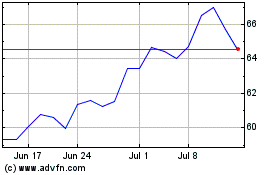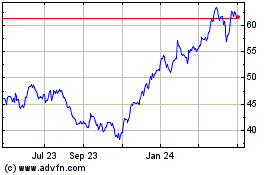By Orla McCaffrey
Citigroup Inc. on Thursday reported sharply higher first-quarter
profit and said it is shutting down most of its consumer-banking
operations in Asia, Europe and the Middle East.
The bank posted a profit of $7.9 billion, or $3.62 a share, well
above the $2.60 a share forecast by analysts polled by FactSet. A
year earlier, Citigroup had reported a quarterly profit of about
$2.5 billion, or $1.05 a share.
Citigroup also said it would exit its consumer operations in 13
countries, mostly across Asia, to focus on wealth management and
other businesses.
Jane Fraser, who took over as chief executive officer last
month, said in a statement that those consumer banks were excellent
businesses, but "we don't have the scale we need to compete." She
said Citigroup would continue to invest in wealth management and in
the businesses that work with corporate clients in Asia.
Citigroup is a giant on Wall Street, but it is relatively small
in U.S. consumer banking, a combination that some analysts and
investors have criticized. Ms. Fraser said in January that the bank
would restructure the businesses that manage money for wealthy
customers, with the goal of getting to clients earlier and keeping
them as they grow richer. The bank said Thursday that it will
operate consumer banking in four "wealth centers" where it expects
strong growth for the wealth-management business: Singapore, Hong
Kong, the United Arab Emirates and London.
Citigroup's brand in some overseas markets is strong, but the
consumer banks there are relatively small and costly. Revenue from
the operations the bank is winding down accounted for about $4
billion of Citigroup's 2020 revenue of roughly $74 billion. Their
expenses totaled about $3 billion, compared with 2020 total
expenses of about $43 billion.
"We're looking to be very clinical in looking at the businesses
that we want to retain and where we can secure leading market
positions," Chief Financial Officer Mark Mason said on a call with
reporters.
In the first quarter, Citigroup's total revenue fell 7% to $19.3
billion. That was still ahead of the $18.8 billion analysts had
expected.
During the same period a year ago, the coronavirus pandemic was
taking hold in the U.S., and big banks including Citigroup set
aside billions of dollars to prepare for potentially bad loans.
The reserves weighed on earnings for much of last year, but the
big loan losses so far haven't materialized, thanks in part to
government stimulus measures that have kept the economy afloat.
Banks' first-quarter results have soared partly because their
year-earlier results were hit so hard by their pandemic
preparations.
New York-based Citigroup released $3.85 billion in reserves, a
major driver of its first-quarter earnings. The bank released $1.5
billion in the fourth quarter.
A crazy quarter in markets, marked by a boom in special-purpose
acquisition companies and stock-market records, helped power other
big Wall Street banks. JPMorgan Chase & Co. and Goldman Sachs
Group Inc. both reported record quarterly profits on Wednesday.
Citigroup didn't catch all the same waves. It enjoyed a 46% jump
in investment-banking revenue, largely from a surge in underwriting
new initial public offerings, SPACs and other sales of stock.
But Citigroup's revenue from advising companies on deals was
down, while its competitors at JPMorgan, Goldman and Bank of
America Corp. all notched gains.
Citigroup's trading revenue was essentially flat, rising 1%.
Trading revenue rose 47% at Goldman and 25% at JPMorgan. Adjusted
trading revenue rose 17% at Bank of America.
Mr. Mason said lingering economic uncertainty among corporate
clients, coupled with high liquidity levels, weighed on the firm's
Wall Street operations.
"Going forward, I think the clients agree that the recovery and
growth will be asynchronous," Mr. Mason said. "And they, too, are
looking at many of the same signs that we've talked about, in the
way of signals for recovery."
Expenses increased 4% to $11.1 billion, in part because of the
bank's effort to revamp its risk and control systems. Investors
have been watching that line closely after regulators ordered
Citigroup to make significant changes in its risk system.
Earnings in the institutional clients group, which includes
investment banking and trading, rose 64% to $5.9 billion, but
revenue fell 2% to $12.2 billion.
The consumer bank reported a profit of $2.2 billion, compared
with a loss a year earlier of $740 million. But revenue fell 14% to
$7 billion.
Citigroup shares fell slightly on Thursday, but they have risen
about 18% since the beginning of the year. The KBW Nasdaq Bank
Index, which tracks shares of the largest lenders, is up 26% so far
this year, compared with a 10% gain in the S&P 500.
Write to Orla McCaffrey at orla.mccaffrey@wsj.com
(END) Dow Jones Newswires
April 15, 2021 12:22 ET (16:22 GMT)
Copyright (c) 2021 Dow Jones & Company, Inc.
Citigroup (NYSE:C)
Historical Stock Chart
From Mar 2024 to Apr 2024

Citigroup (NYSE:C)
Historical Stock Chart
From Apr 2023 to Apr 2024
